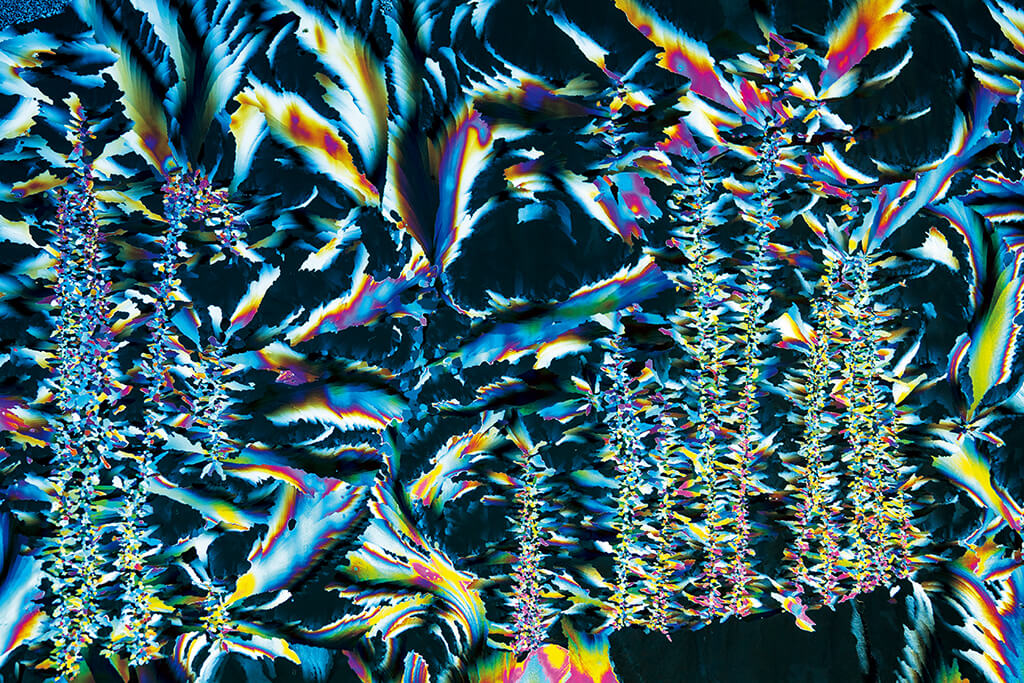We all know that a polarising filter (PL filter) helps to intensify colours and reduce reflections, but did you know that it can also create art of a different kind? Here is how one photographer used it to create the intriguing work that you see below. (Reported by: Chikako Yagi, Digital Camera Magazine)

EOS 50D/ EF70-200mm f/4L IS USM/ FL: 121mm (194mm equivalent)/ Aperture-priority AE (f/4, 1/125 sec, EV -0.3)/ ISO 100/ WB: Daylight
With PL filter
Window frost like you have never seen before
Frost forms when the water vapour in the air freezes into ice crystals. I woke up one extremely chilly winter morning to find them on the inside of my windows, forming beautiful patterns that remind one of their other name, “ice flowers”. They would have made a lovely picture the way they were, but I went one step further and decided to play with some polarisers, turning the shapes and patterns that nature created into abstract art.
Key equipment
- Telephoto lens
- 2 polarisers
I used one CPL filter and a sheet of polarising film. As long as you have one polariser that can be attached to your lens, and another that you can place freely behind your subject, any kind should work.
My setup

A: CPL filter – Placed on the lens
B: Polarising film – Placed outside the window
C: Window frost – On the window indoors, between the polarisers
Once you are done, simply turn the PL filter on your lens until you get the desired effect. Magic!
How it works
If you look at a polariser under a microscope, you will probably see stripes on it. These stripes ensure that only light travelling in one direction will be able to pass through the polariser. This is called “polarisation".
When two polarisers are aligned so that their polarisation planes are at right angles to each other, such as if one is positioned to polarise vertical light and the other, horizontal light, it is known as a “crossed Nicols layout”. This results in cross-polarisation, where the polarisation effects of each polariser interfere with each other, creating the psychedelic colours that you see.
Try this:
In my setup, polariser B polarised the light before it reached my subject. You would get a slightly different image if you placed polariser B between the subject and the PL filter on the lens, although the crazy colours would still be there.
---
Now that you know how this works, why not try it with different subjects and see what you get?
Here’s something else to try with a PL filter the next time you are on a plane:
Plane Window Landscapes: A Graphical Effect with Iridescent Colours
For other ways to create artistic effects with just your camera, check out:
Slow Shutter Art: Turn a Shot into an Abstract Watercolour Painting
What Unique Images Can I Achieve With Circular Panning?
How to Capture Artistic Handheld Shots of Firework Displays!
Receive the latest update on photography news, tips and tricks.
Be part of the SNAPSHOT Community.
Sign Up Now!About the Author
A monthly magazine that believes that enjoyment of photography will increase the more one learns about camera functions. It delivers news on the latest cameras and features and regularly introduces various photography techniques.
Published by Impress Corporation
Chikako Yagi was twenty when she started teaching herself photography using a film SLR camera. She left regular employment to become a full-time landscape photographer in 2016. An apprentice of renowned photographers such as Kiyoshi Tatsuno and Tomotaro Ema, she is a member of the Shizensou Club, which was founded by the former and is one of Japan’s most famous landscape photographers’ clubs. In 2013, she was selected as one of the Top 10 Photographers of the Tokyo Camera Club.
www.chikakoyagi.com
Instagram: @chikako_yagi


































